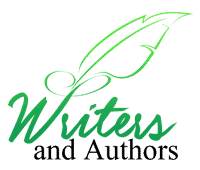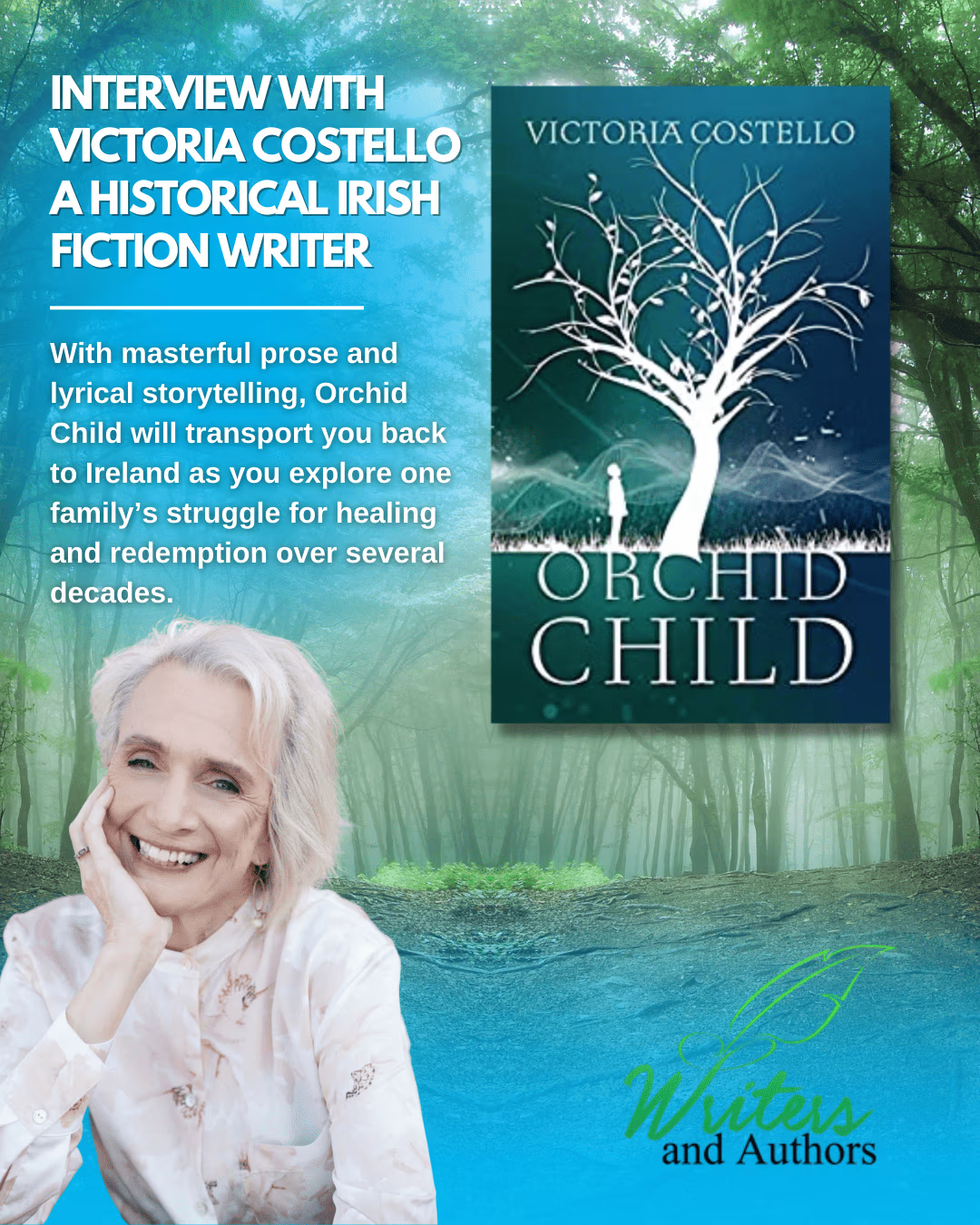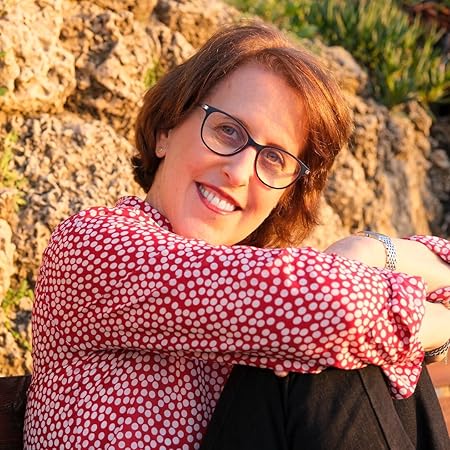Interview with Victoria Costello, a Historical Irish Fiction Writer. Orchid Child is an enchanted family saga that charts the hardships and losses borne by three generations of an Irish-American family but with a twist. With masterful prose and lyrical storytelling, Orchid Child will transport you back to Ireland as you explore one family’s struggle for healing and redemption over several decades.
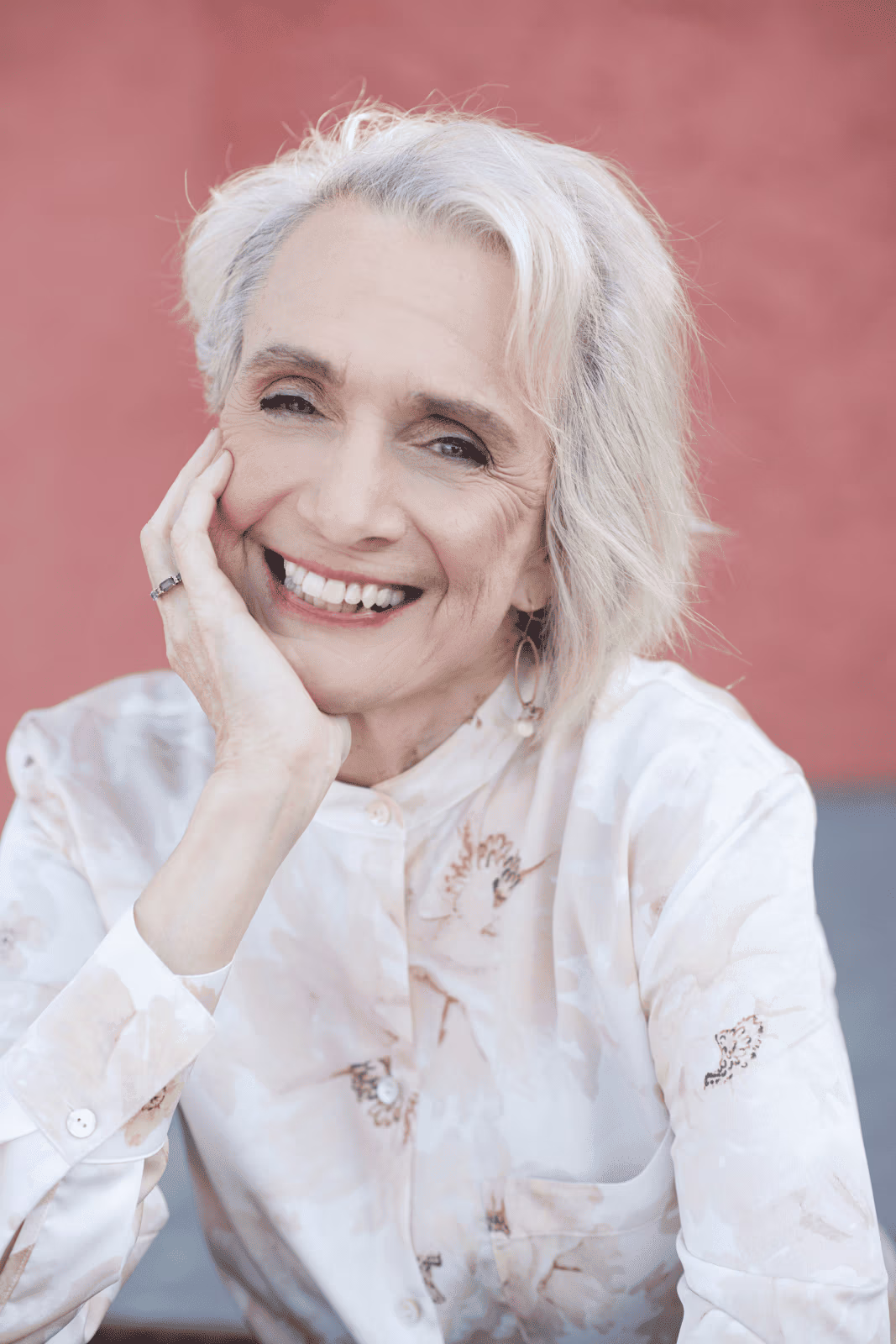
Orchid Child is an enchanted family saga that charts the hardships and losses borne by three generations of an Irish American family but with a twist, brought about by the youngest family member, its orchid child, Teague, a voice-hearing teenager who halts the chain of suffering that came before him by tapping his neurodiversity and the ancient wisdom of his Celtic ancestors.
To depict such a reversal of fortune over a single century takes equal parts history, neuroscience, and Celtic folklore. The science part of the story is embodied by the character of Kate, Teague’s aunt and legal guardian, whose rising star in neuroscience has crashed in the wake of a sex scandal. To salvage her career, Kate goes to West Ireland to conduct an epigenetic study of one rural county’s historically high rate of mental illness, bringing her nephew along.
But Kate’s study meets stiff resistance from the townspeople who want nothing to do with this painful part of their history, while Teague is given a warm welcome by the local Druid fellowship, who identify the boy’s strange perceptions as the gift of second sight. This sets up a conflict with Kate who views her nephew’s differences as a medical problem to be solved. It also brings the family story full circle as Kate learns she’s come to the place her grandparents fled eighty years earlier, accused of betraying the Republican cause in the 1920 Irish Rebellion. It soon becomes clear to Kate that not only is she in the awkward position of studying her own genes, but she’s stumbled on the first of a series of dark secrets in her family’s past. Buy Now on Amazon
What is the PRIMARY benefit, above all others, that your potential reader will gain from reading this book? While many novels portray intergenerational trauma, to the point where some say it’s a trauma glut, few delve into how people can heal the wounds they carry, which is at the heart of the story in Orchid Child.
If you had to compare this book to any other book out there, which book would it be? Think Lessons in Chemistry, only neuroscience. My protagonist Kate is a nerdy, emotionally challenged, scientist who loses the job she loves when she takes the fall for an affair she’s having with the lead scientist at her lab. But, like Elizabeth Zott, Kate fights back and shows up her old boss by doing her own breakthrough science. She not only pioneers research on the epigenetics of orchid children—those born with an unlucky genetic hand who tap their neurodiversity to come back at life with a five card straight—again, like Elizabeth Zott, she becomes an instant parent, forcing her to confront the emotional damage that keeps her from opening her heart.
Hundreds of thousands of books come out every year. Why should someone buy THIS book? Orchid Child details hardships familiar to readers who are second and third generation members of immigrant families from anywhere in the world, but it also provides a road map for reclaiming their ancestral heritage as a step towards healing.
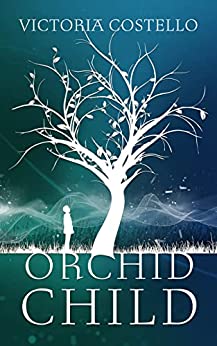 Who is your target audience? Adult readers of contemporary and historical fiction; Adult and YA readers of metaphysical and psychological fiction, magical realism, and fantasy. Irish Americans and members of the Irish diaspora throughout the world (Canada, Australia, the UK). Adult and YA readers, mostly women, mothers and grandmothers (age thirties to eighties); interested in Celtic folklore, paganism, Druids, occult, witches, goddesses. Readers who identify as neurodiverse. Readers who like strong female protagonists, especially scientists like Elizabeth Zott; those interested in psychology, epigenetics and neuroscience. The primary benefit offered by Orchid Child is that it puts all these interests into one immersive story.
Who is your target audience? Adult readers of contemporary and historical fiction; Adult and YA readers of metaphysical and psychological fiction, magical realism, and fantasy. Irish Americans and members of the Irish diaspora throughout the world (Canada, Australia, the UK). Adult and YA readers, mostly women, mothers and grandmothers (age thirties to eighties); interested in Celtic folklore, paganism, Druids, occult, witches, goddesses. Readers who identify as neurodiverse. Readers who like strong female protagonists, especially scientists like Elizabeth Zott; those interested in psychology, epigenetics and neuroscience. The primary benefit offered by Orchid Child is that it puts all these interests into one immersive story.
Did your environment or upbringing play a major role in your writing and did you use it to your advantage? Are your characters pure fiction, or did you draw from people you know? Orchid Child is, in part, a work of autobiographical fiction, or autofiction. The characters populating my debut novel are based on the real lives of several broken people, me included, and a tragic chain of events I previously shared in a memoir titled, A Lethal Inheritance, A Mother Uncovers the Science Behind Three Generations of Mental Illness published by Prometheus Books in 2012. I identify with the character of Kate, that is, if I’d been a neuroscientist, and not the desperately worried mother of an adolescent son who’d just been given the worst diagnosis in psychiatry: schizophrenia; the story I tell in A Lethal Inheritance. The study that Kate takes on in Orchid Child adheres closely to an actual joint Irish American study in West Ireland, done in the late 1990s, investigating the prevalence of mental illness among descendants in families affected by schizophrenia in earlier generations.
Although the criminal and IRA gunrunning plotlines of Orchid Child are fiction, its main characters and themes parallel the history of my Irish American family. The novel also reflects my experience as a mother of a newly diagnosed teenage son, and my search through family history to discover traces of the mental illness that I was confronting in my son—and eventually in myself. It was only after my son’s diagnosis that I learned I was clinically depressed and had been all my life. I now identify as neurodiverse, as does my son, who did, in fact, recover from the dreadful diagnosis he received as a teenager. His experience of illness and recovery inspired the character of Teague. My real-life father, my model for the character of Jack, Kate’s father in Orchid Child, was a member of the NYPD. Kate’s grandmother, Ellen, in Orchid Child, is based on my Irish grandmother who made the same journey from Ireland to New York City at the turn of the 20th century. Although she died in the 1918 flu epidemic, my grandmother has been a spiritual guide who’s inspired me all my life. Buy Now on Amazon
Tell us your most rewarding experience since publishing your work? I’ve been thrilled when some of my first readers, pre-publication, tell me how I helped them connect the dots between family history, mental health, and ancestral healing.
How would you describe your writing style? I usually begin with a feeling and then connect it with a character and a situation, in that order. For Orchid Child that feeling was one of disconnection, of not belonging anywhere, something I felt which I gave to Kate, along with a fair number of my neuroses, e.g. her Daddy fixation.
Are you more of a character artist or a plot-driven writer? Character leads to plot for me.
What do you hope to accomplish with your book other than selling it? I hope to touch people and inspire them to look at their own family histories for clues to self-healing by understanding the roots of their identity and perhaps even gaining a clear idea of their true purpose.
How can our readers get in touch with you?
Orchid Child book trailer on YouTube
Subscribe to my newsletter, Good Folk News
Where can our readers purchase your book?
E-book worldwide; paperback in US bookstores (Distributed by Ingram).
